The story of the Barker family
in the Levant, a private study commissioned by Michael Barker
William Barker, youngest son of Thomas Barker, of the Hall,
near Bakewell, Derbyshire, a descendant of an old country family, purchased
an estate in Florida, where he settled only to be compelled to leave during
the American war of Independence. He proceeded to London, en route for
India, but was compelled owing to ill health to break his journey in Smyrna
where he settled and raised a numerous family who have remained firmly
established in various parts of the Levant for nearly two centuries. All
the Barkers hereafter mentioned belong to this family and are descendants
of William Barker, the original settler in Smyrna.
William’s thirteenth child Benjamin Barker (1797-1859) was in Alexandria
during the summer and autumn of 1822, having escaped by a miracle from
the earthquake at Aleppo during which he computed 25,000 lives to have
been lost. William’s great nephew, Charles Piott Barker served in the
Royal Navy at Navarino, 1827. From January 1828 to 1834 he was employed
in a subordinate capacity at the Consulate General in Egypt, and later
held various consular posts in the Turkish Empire. During the Crimean
War he acted as staff interpreter.
Edward Barker (1784-1844) sixth child to William Barker, was Consular
Agent in Cairo for United Kingdom, 21st September 1830 and 17th January
1831, and thereafter Vice-Consul to the 31st March 1834. It shows the
predominance of Italian at that period, as the language of commerce in
the Levant that the letters exchanged between Vice-Consul Barker in Cairo
and Vice-Consul Sloane in Alexandria, both of them of British descent
and background, were exchanged in that language. During Edward Barker’s
period in Cairo the number of British subjects under his care increased
from 200 in 1828 to over 1000 in 1830: well over 90% of this latter figure
were either Maltese or Ionians. In 1831 Edward Barker fled temporarily
from Cairo to Rosetta, where his brother John, the Consul-General (q.v.)
had a house, in order to escape the ravages of cholera. He was in later
life, British Consul at Damascus, and was created a Knight of the Greek
Order of the Saviour.
Edward B. Barker, wrote an account of Consul-General John Barker’s life.
For three years, 1831-4, he acted as Clerk in his father’s office in Alexandria,
and he was for some time the Private Secretary to Consul-General Campbell
(q.v.). In 1836 he was appointed Vice-Consul at Suedia in Syria, and was
subsequently Consul in various parts of the Turkish Empire.
Frederick Peter George Barker (1825-1899), second son of the original
Edward above named, arrived in Alexandria to found the firm Barker &
Co., Shipping Agents in 1845 [an example of a commercial letter a year after]; he was joined shortly afterwards by his
brother Henry Barker (1829-1907) from whom the present Alexandria firm
is descended. Originally in a very small way of business the Barker firm
was not considered worthy of note in the return of British commercial
houses of Alexandria in 1848, and F.P.G. Barker is first mentioned as
a …?… only regular line of steamers trading with Egypt: Burns MacIver
& Co., (the forerunner of the Cunard Line). Agencies followed for
the Wilson and Papyani Lines, and the firm became also large exporters
of cotton seed. On the 10th November 1849 F.P.G. Barker married in Alexandria,
Caroline Lafuente, and in 1880 he and his family moved to Paris where
descendants still exist.
William Burckhardt Barker (1810-1856), son of Consul-General John Barker
and godson of the explorer J.L. Buckhardt was Chancellor of the Cairo
Consulate from May 1831 to July 1832. A member of the Royal Asiatic Society,
he was a well known traveller and a very distinguished linguist acting
as Professor of Arabic, Persian, Turkish and Hindustani for some time
at Eton under Provost Hawtrey. At various times he lived in many different
parts of the Levant. In 1834 he was in business in Beirut; in 1840 he
was appointed Vice-Consul at Tarsus, where he already resided, but not
before some allegations against his character had reached the ears of
Consul General Hodges had to be disposed of. It was Lloyd George’s predecessor
Campbell who had pressed his claims on Palmerston. H.J. Ross met him in
Mosul in December 1847; at the time of his death from cholera during the
Crimean War, he was Chief Superintendent of the British Land Transport
Depot at Sinope. W.B. Barker was regarded as one of the greatest linguists,
oriental and European, of his day, and he published a Turkish grammar,
together with elementary Turkish and Hindi reading books, as well as a
historical work entitled “Lares and Penates: or Cilicia and its Governors”
1853.
Barker, John (1771-1849)
John Barker, the original Barker to establish himself in Egypt, being
appointed British Consul in succession to Peter Lee in 1826, was born
in Smyrna in 1771, and his family were already well known in Egypt which
had been visited by several of his brothers and with whose commerce they
were already concerned prior to his arrival in an official capacity. John
Barker had been educated in England, and at the age of 18 entered the
private banking house of Peter Thelussen in Philpot Lane where he soon
rose to be confidential clerk and cashier. In 1797 he left London as Private
Secretary to John Spencer Smith, British Minister Plenipotentiary [envoy
with full powers] to Sublime Porte [Ottoman Sultan, at the time
being Selim III, reign 1789-1807], brother to Sir Sydney Smith. On
the 9th April 1799 John Barker was commissioned by patent as Pro-Consul
at Aleppo and Agent for the Levant and East India Companies. Thereafter
for the next thirty-three years he was connected with the East India Company.
While at Aleppo he married in 1880, a Miss Hays of that place, who could
already speak five languages fluently at the age of six. By her he had
a numerous and not undistinguished family. On the 18th November 1803 he
became full Consul for the Levant Company, and in the same year he introduced
the practice of vaccination into Asia Minor.
The political difficulties facing him during the Wars of the French Revolution
were considerable, but he always managed to maintain British communications
with India, and the promptitude by which he arranged for the passage of
despatches on one occasion prevented the surrender ..?..
..?.. 1820 he was absent from the Levant visiting France and ..?.. century
the importance of the Levant Company and especially its political privileges
diminished, and accordingly the company surrender its Royal Charter in
1825 with the promise however, that the company’s former servants would
have their rights and privileges guaranteed to them by the British Government.
In the autumn of 1825, therefore, on the death of Peter Lee, Barker was
offered the post of British Consul at Alexandria under Consul-General
Henry Salt, who was already known to him, at least by correspondence.
The appointment was gazetted on the 28th June 1826 and he arrived at his
post on the 26th October of the same year, but he was allowed his salary
of £1000 p.a. from the preceding 5 January, the date on which his
appointment was agreed by both parties. On the death of Henry Salt, Barker
became acting Consul-General October 1827; he was given the substantive
rank of Consul-General for Egypt 7 March 1829 (gazetted 30th June) though
he had earlier been told by the Foreign Office that he could have no hope
of appointment, and he left the country 1st May 1833, being succeeded
as Consul-General by Lt. Col. Patrick Campbell, Barker’s salary as Consul-General
was £1,300 p.a. but he was not appointed Political Agent.
On Barker’s arrival in Egypt in 1826 he found Alexandria still a wretched
town; there was only one very poor hotel, kept by an Italian, and but
two coaches in the place – one belonging to the Viceroy Mohammed Ali,
and the other to his son-in-law Moharrem Bey. A large okel or khan for
the consuls was being built but it took two more years to complete. John
Barker had his first audience with the Viceroy in the 25 November 1826
and was extremely pleased with the attention he received, superior to
those paid to the recently accredited Consul-General of Austria and Sardinia.
From Mohammed Ali’s assertion: ‘I never had a master’ Barker presumed
a reference to the Sultan, and many of Barker’s early despatches are concerned
with the building of Mohammed Ali’s fleet – an obvious threat to the power
of his suzerain. The news of Navarino the Pasha received as a fatalist,
but, in case Great Britain should be at war with the Turks, he promised
in the strongest terms that British subjects would be safe in their persons
and quality: ‘I know well how to appreciate and maintain the reputation
I have acquired for justice and liberality,’ he told Barker, adding that
if the Sultan, as was rumoured, should order a massacre of Christians,
he, the Viceroy, would regard him as an infidel.
Barker considered Alexandria to have a very agreeable and healthy climate,
and to be quite a pleasant place in which to live; it was, however, very
expensive, and he complained that his foreign service allowances were
insufficient. On Chancery business at Alexandria in 1828 he was keeping
four persons at work, eight hours a day except Sunday, and the ensuing
fees were insufficient to meet all the charges. In fact his early relations
with Salt were clouded by a dispute over the appointment of notarial fees
between January 5, 1827, the date of Barker’s nominal appointment, and
October 27, the date when took over effective control of the office. As
a result of the dispute, in which the Foreign Office ruled ..?.. resigned.
Even when ..?.. as Consul General Barker’s allowances as well as his salary
were increased he still found himself in financial difficulties. As a
result he was not surprised with the Viceroy’s pecuniary embarrassment
as with the fact that he could do so much with so little.
The house which Barker took on arrival belonged to Robert Thurburn but,
although he paid £290 a year rent, the rain came through the roof,
and when Lady Georgina Wolff and her baby were staying with them they
had to sleep under the protection of an umbrella – this is the same house
as that in which Consul-General and Mrs. Salt had to sleep under the billiard
table in wet weather.
It was in this house that some ten people of various families died in
1827 and 1828 before it was discovered it was built over some cisterns
or sewers. The garden became the first British Protestant Cemetery in
Alexandria after the death of Consul-General Salt who was buried in it
in1827. Remains and monuments have now been removed to one of the British
Protestant Cemeteries at Chatby, and the former site is now occupied by
a garage and by the grounds of the Armenian Orthodox Cathedral near Rue
Abdel Moneim.
At Alexandria John Barker was kept very busy. He was President of the
European Hospital in 1827; towards its support all ships entering the
harbour paid a fee of $1, and in addition a collection was annually made
among the resident British merchants; on certification of the latter sum
to London an identical amount was subscribed also by the British Government,
thanks to a law of 1826. Accordingly from that date there are annual subscription
lists of Alexandria British residents together with the names of two British
trustees for each year.
In John’s time communications with Europe were improving. In July 1827
John Barker once received a London letter via Paris and Marseilles in
18 days; newspapers often arrived in 20 to 28 days. In 1828 about 800
ships annually entered the harbour of Alexandria, of which an average
of 210 were British or Ionian [islands of Western Greece under British
rule].
After the battle of Navarino (20th October 1827) Barker was in charge
of freeing the Greek slaves in Egypt. Out of 6000, only 400 availed themselves
of his services, and, though the Foreign Secretary, the Earl of Aberdeen,
was very pleased with his efforts when Ibrahim Pasha’s army returned from
the Morea in 1828, 400 Greek women accompanied their Muslim husbands to
Cairo. In the same year the East India Company granted Barker £100
a year as their agent in Egypt, and he moved to a new and much healthier
house in the New Okella near the sea. In 1829 verification of his succession
as Consul-General reached him from Lord Aberdeen, and was delighted to
find that as a mark of approval his allowances were over £400 p.a.
greater than those of Consul-General Salt, who had complained that he
had only some £1,700 all told before paying taxes.
As Consul-General in Egypt, John Barker had to follow the movements of
the Viceroy and had to spend part of each year in Cairo, where he disliked
the dust and heat, much preferred to live in Alexandria. In the summer
of 1829, one of his daughters danced a quad- ..?.. although his relations
with the Viceroy were often strained he nevertheless had a considerable
admiration for him and more especially for his son Ibrahim Pasha. Among
his more distinguished guests, Benjamin Disraeli, the future Prime Minister,
together with his companions Clay and Meredith, the latter of whom, engaged
to Disraeli’s sister, died in Egypt of smallpox, was entertained by him
in 1831. Through Consul Barker, Disraeli had an audience with the Viceroy,
who ever enjoyed European company and information, and with whom Barker
records many hours of interviews. In 1829 Barker computed that the Viceroy
sent between 500,000 and 600,000 dolars as yearly tribute to the Sultan,
yet despite frequent strains in Anglo-Turkish as in Anglo-Egyptian relations,
Barker ever warned Mohammed Ali that any idea of dethroning the Sultan
was a dangerous delusion. He also had to restrain Mohammed Ali from anti-French
activities, and he gladly accepted an obelisk from Karnak as a gift to
Britain, offered because of French pressure for comparable gifts of antiquities.
In 1830 Consul-General Barker was ordered to Cairo on a confidential mission.
Mohammed Ali feared the presence of the French in Algiers; he was worried
lest they should aim at taking over the entire North African coast line,
and when invited to co-operate in this achievement he was very willing
to give way before British warnings. It was on the occasion of this interview
in March 1830 that Mohammed Ali made his famous declaration: “Without
the English for my friends I can do nothing… I foresaw long ago that I
could undertake nothing grand without her permission. Wherever I turn
she is there to baffle me.”
In Alexandria John continued the interest he had shown in Aleppo in the
overland route to India. He encouraged Lieutenant Thomas Waghorn in his
early efforts and sent elaborate answers to a questionnaire from the East
India Company, but long experience made him feel, like Consul-General
Baldwin, a generation earlier, that most of his efforts would be in vain.
John Barker was sympathetic with the Viceroy’s educational efforts, and
in one of his despatches refers to “the Pasha’s of Egypt’s University
at Kasr el Ain near Cairo where 1500 youths are educated at His Highness’
cost.” He followed with interest the achievement of Mohammed Ali in building
an expensive fleet, but in his political conversations with the Viceroy,
despite considerable personal friendship, he could not always free himself
from his Syrian background and prejudices of his early life.
When Salt was seriously ill and dying in 1827 “Mohammed Ali absolutely
refused to communicate with Mr. Barker who unfortunately was obnoxious
to him”, according to Madox, a contemporary traveller. Although Palmerston
enjoyed Barker’s despatches, in which to please the Foreign Secretary
he often enclosed spitefully some of Mohammed Ali’s more oriental remarks,
giving a not altogether fair picture of the Viceroy who had to work with
very unpromising material (see Bowring), nevertheless he was sharply rebuked
from London when he refused to congratulate Mohammed Ali on Ibrahim Pasha’s
victories in Syria and the fall of Acre. Barker tried to counteract the
effect of this criticism by stressing the markedly favourable terms of
a Viceregal document in his favour in regard to his estates in Suedia
..?.. for the use of the phrase ex-Viceroy in his despatches after ..?..
depose his rebellious and overweening vassal. In one of his early despatches,
Campbell, his successor, refers to the bad terms substituting between
Barker and the Pasha. At the same time Barker fell out with the whole
body of British merchants in Alexandria over a case in the consular courts.
A British merchant and a British sea captain were accused of taking a
ship and its cargo out of British jurisdiction though there was a chancery
writ against them. The men were undoubtedly guilty, but Barker acted in
a singularly high-handed manner, imprisoning the two men in his local
consular prison; refusing them bail; and also failing to call in the normal
four assessors at his hearing of the case, at which the evidence though
strong was by no means conclusive; and indeed the law agent to the Foreign
Office doubted the legality of Barker’s action so far outside home jurisdiction.
Unfortunately for Barker the cargo was one of arms, and Mohammed Ali was
very desirous to purchase. Accordingly the British merchants in Alexandria,
practically all of whom were dependent on the Pasha and his monopolies
for a means of livelihood, were practically unanimous in their criticism
of the Consul-General, and in their criticism and unanimity they were
joined by Senior British Naval Officer at port, Captain John Lyons, who
refused to obey Consul-General’s order to convey the prisoners to Malta
en route for England. This was but one of several occasions on which Barker
was at loggerheads either with the officers of the British Navy or with
the British residents.
All in all Barker’s final days in Egypt were clouded by many disagreements.
An honourable, upright and hardworking official, his letters and despatches
show certain disagreeable traits of character. They are at times obsequious
and often self-righteous. He was invariably convinced of his own rectitude
yet accepted reproof with unnecessary humility. Probably he alone was
surprised when orders for his replacement by Colonel Patrick Campbell
arrived early in 1833. The Consul-General Barker as a reward for his long
services to the Levant Company was granted a pension of £400 p.a.
but his expenses in Egypt has so exceeded his income that even when he
had disposed of his summer house at Rosetta and some of his surplus property
in Alexandria, he had still to await the payment of the first quarter
of his retiring allowance before he left in May 1834 to take up his residence
at the property he possessed through his wife’s family at Suedia, about
15 miles from Antioch. There his long-standing friendship with Ibrahim
Pasha was strengthened, and there he cultivated and experimented in one
of the most famous gardens in the middle east, from which he earned the
Gold Medal of the Royal Horticultural Society. He possessed a well furnished
library with regular newspaper files, including “Galignani’s”, “The Illustrated
News”, and “The Constantinople Gazette” according to a passing visitor.
In later years, his son Edward B.B. lived in a small house in the grounds
where he used to prove himself an excellent shot. John Barker died of
apoplexy at his summer house on Mount Rhesus on October 6, 1849 at the
age of 78 and was buried at Bar..?.. published contributions to various
learned journals and the Annual Register of 1818 reprints one of his articles
from the Asiatic Journal.
Foreign Office in Public Records Office. Boase.
Annual Register
Barker, John: Syria and Egypt under the last five Sultans: Being Experiences
during fifty years of Mr. Consul General Barker – 1876 – ed. by Barker,
E.B.B.
Barker, W.B. ed. by Ainsworth, W.F., Lares and Penates, or Cilicia and
its Governors – 1853
Halls, J.J.: Life and correspondence of Henry Salt
St. John, J.A.: Egypt and Nubia under Mohammed Ali
Ross, Janet (ed.) Letters from the East by Henry James Ross, 1837-1857
– 1902
Neale, F.A.: Eight years in Syria, &c. – 1851
Madox, John: Excursions in the Holy Land - 1834
The Alexandria Barkers a short tree
From about 1550 to 1715, four generations living in Darley Dale and Rowsley
Hall, Derbyshire.
John (Rowsley Hall) 1668-1725 m. Catherine Charlesworth
Thomas (Bakewell) 1709-1752 m. Sarah Morris
William (Smyrna) 1738-1825 m. (2nd) Mary Schnell
He was the fourth son and was bought a membership of the Levant Company
and emigrated to Smyrna in 1760.
Edward (Consul in Cairo 1784-1844 Smyrna m. Anna Maria Mavroyanni
Henry 1829-1907 m. Alice Joyce
Henry, with his older brothers and family, moved to Alexandria in 1848
and opened Barker & Co.
Henry Edward KCMG 1872-1945 Alexandria m. Emmeline (Lena) Cornish
Henry Alwyn CBE 1898-1966 Portugal m. Sybil Cumberbatch
Henry Michael 1923- m. (2nd) Kay Seymour
In 1956 all British and French subjects were expelled from Egypt as a
result of the Suez War.
John Barker (1771-1849), Levant Company Consul-General in Aleppo
(1799-1825) and H.M. Consul-General in Alexandria (1826-33)
John Barker was the first of the family to live and work in Alexandria.
William Maltass, married to his half-sister Memica, and John’s younger
half-brother, Edward, were the Consuls in Cairo during the same period:
William Maltass from 1825 to 1829 and Edward from 1830 to 1834.
John’s career has been well recorded and the books (see below) give a
good description of Alexandria and the Levant at that time.
John Barker, born on 9th March 1771, was the fifth child of William and
Flora Robin of Smyrna. His father sent him to his Uncle John at Bakewell
[Derbyshire] for his education. At the age of 18 John entered the private
banking house of Peter Thellussen in Philpot Lane. In 1797 he left London
as Private Secretary to John Spencer Smith, British Prime Minister Plenipotentiary
to the Sublime Porte (Constantinople).
1798, in July Napoleon landed in Egypt.
John describes the discomforts at Constantinople, attendant upon an audience
with the reigning Sultan, even Ambassadors being compelled to wait as
long as four hours before being admitted to the audience chamber and allowed
face-to-face contact with the Sublime Presence:
“I must not omit to mention that when we were standing before the Sultan
there were two colossal negroes, on each side of the throne, the tallest
and ugliest that could be found, making faces – that is, grimaces – at
us, and scowling the whole time, and saying, loud enough to be heard,
Kish: Kish: - which means “drive them out: drive them out”.
In August Nelson destroyed the French fleet at Abukir Bay (Alexandria).
In April 1799 John was commissioned by patent as Pro-Consul and Agent
for the Levant and East India Companies at Aleppo where the widow of the
Consul Robert Abbott who died in 1797 after succeeding David Hays, her
first husband, had been acting for two years.
John held this appointment until the dissolution of the Levant Company’s
charter in 1825.
Aleppo, in Syria, then a province of the Ottoman Empire, was the central
overland staging point between Europe, Basrah and India and an important
trading centre both for the Levant and East India Companies.
On 15th June 1800, John (aged 28) married Marianne (aged 21 or 22) daughter
of the late David Hays at Aleppo: she could speak five languages fluently
by the age of seven. Marianne brought him a sizeable dowry: granddaughter
of Thomas Vernon of Hilton Park “she had a jointure of ten thousand pounds,
placed in the Bank of England by the trustees of her aunt Miss Amelia
Hays’s Will, Sir Charles Pole, Bart and Samuel Bosanquet, Esq., and as
much in jewels and landed property”.
Marianne’s father, David Hays, died (probably from thirst) on the difficult
and dangerous 48 day journey in 1786 from Aleppo to Basrah (Boussorah)
with J. Griffith M.D. who was on his way to India. Marianne then aged
7 or 8, went with them and returned from Basrah under the supervision
of the East India Company representative.
1801, the Marquis of Wellesley wrote to ensure the Consul’s active assistance
for the troops transferring from India to help in the attack on Napoleon
in Egypt.
In September the French were driven out of Egypt by the British (Gen.
Abercrombie) after Napoleon’s three year invasion.
Lord Elgin replaced Sir John Spencer Smith as Ambassador to Turkey.
On 18th November 1803, John became full Consul for the Levant Company,
in the same year introducing the practice of vaccination to Asia Minor.
The potential difficulties facing him during the Anglo-French wars were
considerable but he managed to maintain British communications with India,
and the promptness with which he arranged for the passage of despatches
on one occasion prevented the surrender of Pondicherry to the French.
During the French campaign in Syria he received from the Sublime Porte
a gold medal and a snuff box set in diamonds transmitted by the hands
of his friend Sir Sydney Smith.
Apart from the more serious matters, the function of a British Consul
in the Levant involved attendance at the weddings of his dragomen and
native dependents who are “generally very wealthy merchants, some of them
trading to India, who could load their tables with real silver plate,
and set down one hundred and fifty covers”.
“In summer time, when the marriages generally take place, the courtyards
are illuminated at night with coloured lamps and nightingales in cages
are hired and placed among the shrubs and trees, and sing at intervals
when the music ceases.
The dazzling diamonds of the ladies and the varied colours of their dresses,
the lights, the singing of the birds, the trickling of the water falling
on the marble basins, make one fancy it to be fairyland”.
At celebrities such as these the consumption of tobacco for hookahs, with
food and drink without limit “was equal to a whole year’s average”. Indeed,
so much was spent on marriages that the parties incurred debts which could
not be paid off for a year or two. The time came when “keeping up with
the Jones” assumed such proportions that the Patriarchs and Bishops, alarmed
at this extravagance, called for restraint, fixing the number of days
to be devoted to them and the maximum sum to be expended.
In 1805 Mohammed Ali Pasha was appointed Governor of Egypt by the Sublime
Porte.
Nelson’s victory at Trafalgar is not recorded as having any immediate
or direct impact on their lives.
In 1807 John had to flee from Aleppo owing to the rupture of relations
between England and the Porte, leaving all affairs in the hands of the
Austrian Consul General. The first stop was Lattakia and then by small
boat to Younee after compelling the “rais”(captain) of the boat, at pistol
point, to land their party there instead of Beyrouth.
They rode up to “Dair-el-Kammar”, residence of the Emir of Druse from
where John was able to transmit news to India and then to the sanctuary
of the monastery of Harissa. His family joined him thereafter having escaped
earlier from Aleppo.
The Consul’s return to Aleppo on 2nd of June 1809 was the occasion for
scenes of local splendour.
At this time the French Consul in Aleppo, friend and shooting companion
of John, was Matthieu de Lesseps, father of Ferdinand, creator of the
Suez Canal.
1811, Mohammed Ali Pasha massacred the Mamelukes at the Citadel in Cairo
thus establishing his own rule.
John Barker helped the eccentric Lady Hester Stanhope (1776-1839) from
her arrival in Syria in 1812 with Dr. Meryon, her personal physician,
and time and again tried to restrain “the self-appointed ambassadress
in Syria”.
Barker & Company 1850-1956
The Company was founded in 1850 by Frederick Barker then aged 25 (taking
60 per cent) and his younger brother Harry, aged 21 (40 per cent). Frederick
crossed the Mediterranean to Alexandria from Smyrna after their father
Edward died in 1844; they had both an education in England, spending holidays
with relatives.
The records show that Frederick left Smyrna for Alexandria in about 1846
and worked for a British company until Henry joined him in 1849/50 with
their mother, five sisters aged from 8 to 27 and their two younger brothers
of 18 to 15. Their eldest brother, John, had earlier returned to London
where his unmarried daughter was to provide a holiday home when Henry’s
sons were at school in England.
Their father’s eldest half-brother, John had been Consul General in Alexandria
from 1826 to 1833 retiring to live at Suedieh on the border of Turkey
and Syria until his death in 1849 and their father had held consular posts
both in Cairo and Alexandria. It is probable that the brothers had some
knowledge of, and introductions to, the business community of Alexandria
which was thriving as a result of Mohammed Ali’s reforms and work on the
communications and economic structure of Egypt, in particular the building
of the Mahmoudieh Canal (1819) which joined Alexandria to the Nile. The
Alexandria to Cairo railway was completed in 1851.
The company started as traders, mainly in grain, developing various interests,
including a shipping agency. The accounts for 1857 show that their brother
John in London may have helped with the initial finance. The business
in general necessitated a good working knowledge of several languages
in particular French and Italian. As the company’s interests developed,
regular journeys, usually of two or three months every summer and combined
with family holidays, were necessary to visit principals in Britain and
Europe leaving a trustworthy staff in Alexandria. Trip to Cairo and Suez
(for mail) were also essential: communications were poor and the journey
from Cairo to Suez was on a desert track with occasional rest houses for
travellers using Waghorn’s Overland Route. One night staying in Shepherd’s
Hotel in Cairo, Henry found himself sharing a room with a corpse.
In 1856 letters show Henry played a leading part in protests to the Viceroy,
Mohammed Said Pasha, and the British Consul General, F.E. Bruce, over
a concession (monopoly) given to a towage company for navigation rights
on the Nile and Canals, and the apparent discrimination at that time against
British interests.
In 1857 the company’s capital was £E 5250; net profits were £E
2750 and Henry is shown to have a good taste in cigars. Frederick and
Henry’s mother, Anna, was receiving £E 150/200 a year.
The signatories to commercial protests to the British Consul General in
1864 included Bulkeley, Thurburn, Barker, Fleming, Peel, Moss, Carver,
Joyce and Haselden.
In 1869 Henry’s interests on behalf of Barker and Company were on a broad
scale in the international community. Between 1859 and 1885 he was given
the rank of Consul in Alexandria by Sweden, Norway and Belgium, receiving
decorations from these countries as well as Italy and Turkey itself.
In 1869 the Suez Canal was opened: Henry was there as a guest of the Suez
Canal Company.
Paris was a business outlet at this time for Barker and Co who had a man
from the Alexandria office there in the 1860’s. One, a Mr Hess, being
caught in the city when it was besieged by the Germans in 1870: his letters
sent to Alexandria during the siege left Paris by balloon (balons montes)
are of philatelic interest (Michael has one of these).
In 1872 Frederick and Henry bought a warehouse, shouna Briggs, in the
Minet-el-Bassal area where a Barker company presence was maintained; the
shouna was bombed in the Second World War and finally commandeered as
a school by the Municipality in 1955.
By 1875 a company report shows the agencies held to be Credit Foncier
of England, Burns and McIver’s Cunard Line, Wilson of Hull, Palmer Hall,
Rubattino of Genoa, London and Southwark Insurance, Queen Insurance and
the Maritime Insurance Company. The shipping lines offered called at a
wide range of ports including America, Antwerp, Le Havre, Italy, the Baltic,
Marseilles, Trieste and Bombay. The same report for the month of August
(1875) shows the total export cargoes for the UK in 8 ships to be barley
(1000 tons), wheat (3700 tons), cottonseed (1160 tons), beans (1500 tons),
wool (70 bales), cotton (185 bales), with coal as the bulk import.
The Committee of a Special Commission set up to improve part of the Minet-el-Bassal
area in 1865/1879, includes the name of Carver, Barker and Ralli.
In 1880 Frederick retired from Barker & Company and went to Paris
with his wife Caroline (nee Lafuente), his 19 year old son and daughter
of 14. His son married but had no children; his daughter Marie (Mimi)
married Edouard Jacquemet living in Pau. Marie died in 1959 (aged 93)
leaving many children, grandchildren and great-grandchildren. When Frederick
left, Harry ran the company on his own until joined by his son, Harry,
in 1891 after Harry had spent a period as a cashier in the National Bank
of Egypt.
Over the next ten years, Henry also brought his four younger sons into
Barker and Company after they had worked in other offices, but all four
preferred different occupations. Percy eloped with a French actress and
was cut off financially (dying in Johannesburg in 1898), Oswald joined
the Army and died at the siege of Ladysmith (1900). Godfrey and Cyril
remained with Barker and Company until Henry retired and then travelled
the world as gentlemen of leisure: both joined the Army in the First World
War, Godfrey was at Gallipoli and Cyril in the desert.
The activities of the company continued to be trading in cereals, cotton
seed cake, etc and the ships agency matters.
Various shipping lines had begun using Alexandria and Barker and Company
held the agencies for several based on different UK ports and trades.
In the first years of the new century Sir John Ellerman took over several
of these lines; Leyland becoming Ellerman, Papayanni, Westcott & Lawrence,
Hall, City, Bucknall and the Wilson Line giving a world-wide service.
The ship’s agency work in Alexandria for Ellerman’s was handled by Barker
and Company. Henry at this time arranged for Tamvaco and Olivier nephews
of his wife Alice’s brother, Arthur Joyce, married to Athina Tamvaco,
to share a part of the business: a gesture which was to have difficulties
in the 1950’s.
In 1905 Henry (now 76) retired after 55 years giving Harry the managing
partnership with Harry’s younger brothers, Godfrey and Cyril, as co-partners.
The latter had no inclination for the business and Harry soon bought out
their partnerships. The 1905 balance sheet shows the company capital to
have been £E 35000.
Harry appointed his brother-in-law, Stanley Gordon, as manager. Stanley
developed the business as a shipping agency while Harry promoted, and
was an executive director of some fifteen different companies covering
a wide spectrum of commerce: the National Bank of Egypt (where his brother
in law, Sir Frederick Rowlatt was Governor), the Alexandria Water Company
(built and managed by his father-in-law, J.E. Cornish), land development,
textile factories, Marconi of Egypt (Harry took the first phone call between
Egypt and the UK from his office in Barker and Company), insurance, building,
engineering, and the Minet-el-Bassal Cotton Bourse [exchange].
An interest in the mining of the semi-precious stone, peridot, on the
Red Sea Island of St George provided too many stones and flooded the market.
During the First World War Harry was appointed representative of the British
Ministry of Shipping: he opened and ran from Barker and Company the British
Ministry of Shipping Office from 1914 to 1919 handling all civilian ships
and cargoes for the military forces.
Harry’s son, Alwyn, joined Barker and Company in 1922. Alwyn obtained
two or three commercial agencies, but ships’ matters continued to be the
responsibility of his uncle Stanley Gordon. In 1927 Harry, as the elected
head of the British Community with its resultant responsibilities and
President of the British Chamber of Commerce, was knighted.
At the start of the Second World War in 1939 Harry again became representative
of the British Ministry of Shipping and handled the same responsibilities
from the Barker offices but on a greater scale than he had handled during
the First World War. These included obtaining the services of any civilian
ship as necessary for the war effort: both the Contomichalos and Embiricos
families have stories of their ships being “chartered” by Sir Harry.
In June 1942 Harry was made a Knight Commander of the Order of St Michael
and St George in the June birthday honours. In July Harry, now aged 70,
died; one month after the death of his brother-in-law, Stanley Gordon:
at the time the Germans were at El Alamein, some sixty miles short of
Alexandria.
His son Alwyn who had rejoined the Army in 1939 as Garrison Adjutant and
later became D.A.A.Q.M.G. [district adjutant assistant to the quarter
master general?], Alexandria, was able to resign and take over Barker
and Company where he appointed Tim Ellis as manager.
In 1945 with the War over and British goods in demand, the ships agency
prospered.
In the same year Alwyn set up Barker and Company Cyprus, financed half
by himself and the family subscribing the remainder, to purchase a 1,000
D.W. ton diesel engine ship sunk by a bomb in the harbour of Mombassa
[Kenya]: the “Pahang”, built in Singapore in 1939, was raised, towed to
Suez and finally repaired. The vessel traded on a regular route from Alexandria
to eastern Mediterranean ports and the Black Sea carrying mainly tobacco.
For some years the ship worked well and other, but coal burning, ships
were chartered for the Line. However competition was building up, and
early in 1956, with lack of experience in ship management, the Cyprus
company was on the verge of bankruptcy: the ship was sold with the loss
of the Cyprus company’s capital.
In 1947, Alwyn’s son Michael joined the company. In 1951 Michael was given
a partnership holding of 51 per cent of the shares, Alwyn with 28 and
Beryl, Alwyn’s unmarried sister, with 21 per cent.
In 1950, the company’s centenary year, the agencies held were for Ellermans,
with its Papayanni, Bucknall, City, Hall and Wilson Lines, also the Bank
Line (Andrew Weir), Ben Line (Wm. Thompson), King Line, Bolton Steamship,
Glover Bros, Koninklijke Rotterdam Lloyd, Counties Ship Management (Mavroleon,
Kulukundis), Hull Blyth, S.A.G.A. (Paris), and Patrisanda (Trieste).
In 1952 there was the Revolution and abdication of King Farouk. Business
became more difficult but controllable. The average annual net profit
of the company at this time was about £E 11,000.
In 1955 Michael, with two Egyptian friends formed the Eastern Desert Mining
Company to mine wolfram (tungsten) at Zaarget el Naam (Valley of the Ostriches)
situated in the desert between Assuan and the Red Sea. Preliminary work
showed reasonable results but the prospecting licences were dated August
1956 and only signed in October that year.
In November 1956, as a result of the Suez incident, Barker & Company
was sequestrated and Admiral Yussuf Hammad (ex-Director-General of Ports
and Lights and a friend) appointed as Private Sequestrator. In 1959, in
accordance with the Anglo-Egyptian Agreement of that year, the company
was desequestrated, but the authorities refused to hand the company back
to the Barkers until certain charges incurred during the sequestration
were met: meanwhile the office remained open with the sequestrator in
charge and earned enough to cover staff salaries.
In 1962, the Egyptian Government issued a decree setting up government
shipping agencies and removing agency work from all private companies:
Barker and Company was put into liquidation.
In London the partners had put in a claim for compensation in 1959. This
was settled in 1967. After payment at 50 per cent to all creditors outside
Egypt, the partners received approximately half of the company’s total
value of £100,000 (as assessed and agreed by the British Compensation
Commission): no interest or inflation allowance was agreed.
Michael received compensation for the expenses incurred by the mining
company but not for the concession itself.
In Egypt in 1978, after protracted negotiations with the Egyptian Maritime
Organisation and the payment of all staff redundancy requirements (there
were about 25 persons, one of whom had been with the company for over
30 years), Barker and Company ceased to exist.
Note:
A few years after nationalising shipping agencies under the umbrella of
the National Maritime Organisation, the Government permitted the creation
of private companies, calling themselves Ship Owners Special Representatives,
to handle ships’ matters other than those directly connected with the
movement of a ship in the port and the handling of its cargo.
Note: Postcard views (late 19th
century) below are not from the Barker archives, but used to give an impression
of the scenery of Egypt in the past.
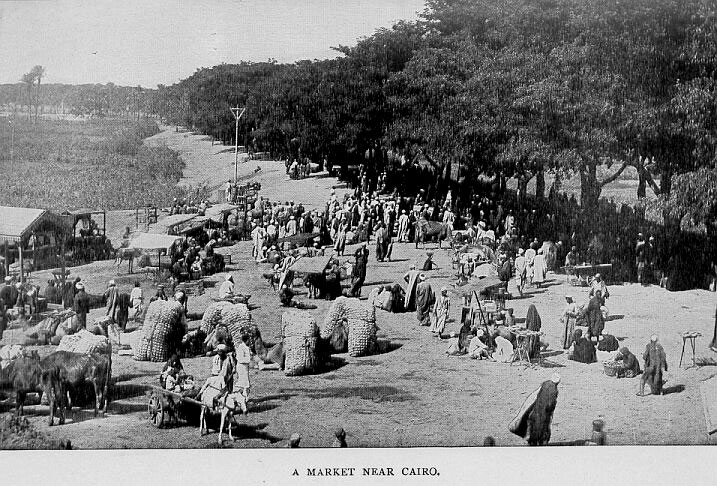 |
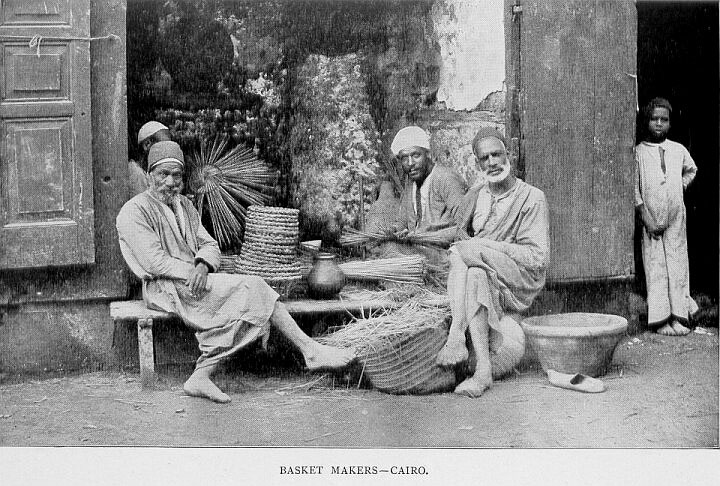 |
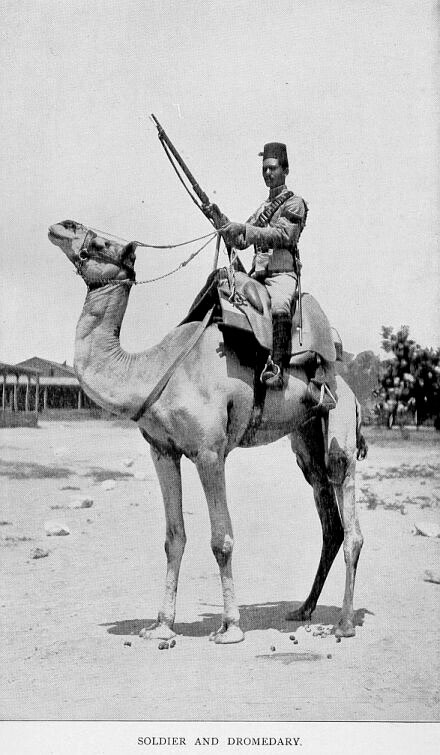 |
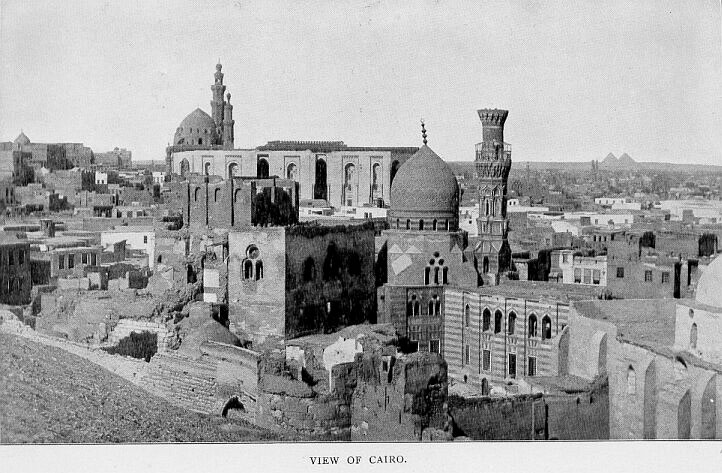 |
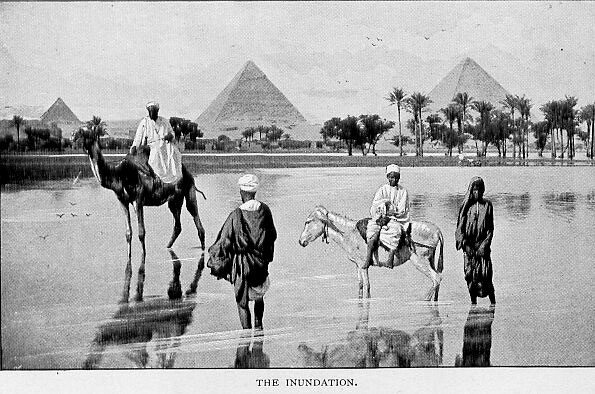 |
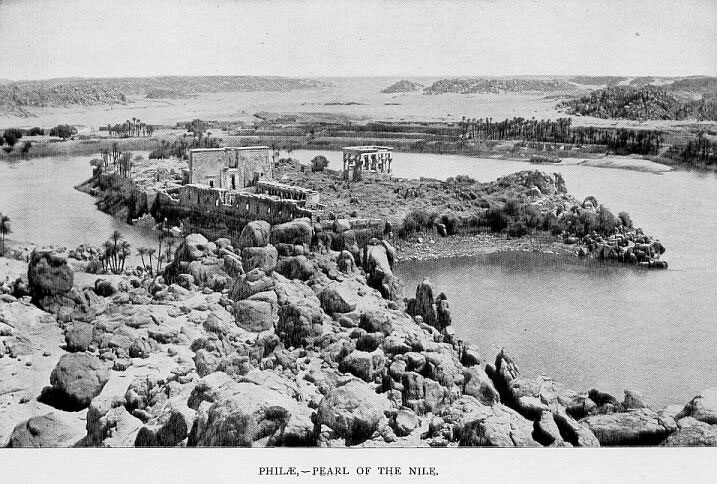 |
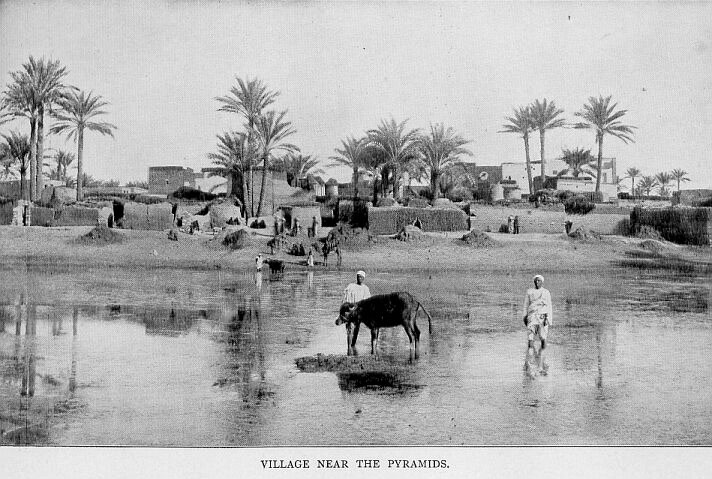 |
 |






